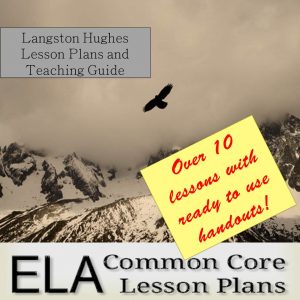Teacher’s Guide to Poems by Langston Hughes
Poetry by Langston Hughes has become a popular part of the high school English curriculum. Expose yourself and your students to Langston Hughes with this Teacher’s Guide.
Lost in the Fog

My joy turned to horror as I read “this poem is pretty” 2,345 times. I wailed, as students chuckled at my anguish. Seconds before peppering the class with sharpened staple removers, I had an idea: maybe I should teach poetry by Langston Hughes. I put the knife sharpener away, called my attorney, and kept her on retainer just in case.
I had work to do. I had to create a list of Langston Hughes’ poems with teaching activities. Here’s what I came up with.
Start with this: Theme in the Poetry of Langston Hughes lesson plan. If you like it (and I’m guessing you will), get more like it by checking out the teaching guide to your right).
Poems by Langston Hughes for High School
Use these Langston Hughes’ poems to spark intelligent class discussions.
“What Happens to A Dream Deferred” - Hughes poses several questions regarding the results of deferred dreams. It touches, through deft use of simile, the end result of discouragement and unfairness. Depending on the prior knowledge of your students, you may want to give background on the history of racism in America.
- Before reading the poem, have students write a paragraph about a time they really wanted something and it was denied. After reading the poem, instruct students to rewrite the paragraph using similes.
- Point out the difference between metaphors and similes. Discuss the images using similes and the image using a metaphor. The metaphor is much more powerful.
- For a complete analysis of “What Happens to a Dream Deferred?” follow the link.
“Dreams” - Hughes employs metaphors to describe life without dreams.
- Instruct students to make a list of things they want to accomplish in life. You may wish to teach students about goal setting.
- Hughes’ images of life without dreams should be visualized. Find a talented student to draw a barren field or a broken-winged bird. Engage the entire class by using individual white boards.
“Let America be America Again” - This ironic look at the America promised by the Declaration of Independence and the Constitution of the United States calls out the hypocrisy of segregation and oppression. Despite its criticism of an unfair system, the poem remains hopeful that America will some day live up to the ideals set forth in its founding documents.
- Read The Declaration of Independence.
- Discuss its promises. Keep in mind these are the principles on which the United States was formed.
- Discuss contradictions between the Declaration and what has been historically practiced.
- Discuss how America has righted or not righted these wrongs through the ideals presented in the Declaration.
“The Negro Speaks of Rivers” - Hughes celebrates the history of his people through the central image of rivers.
- Discuss symbolism.
- Check out this symbolism lesson plan.
“The Dream Keeper” - Hughes employs symbolism, imagery, and personification to contrast the blessed love of heaven and the roughness of the world.
- Distribute an individual white board or fresh slice of drawing paper to each student.
- Draw a line down the middle.
- On one side, draw the Dream Keeper, using Hughes’ description.
- On the other side, draw the world.
“Life is Fine” - Hughes writes about the need for opposition in life, that not only are life’s troubles inevitable, they are necessary to truly enjoy it.
- Before reading the poem, instruct students to write about a time that something bad happened that turned out to be good in the long run or about a time they did something they did not want to and were blessed for having done it.
- Find a complete list Langston Hughes poems and further your study of poetry by Langston Hughes online.
ELA Common Core Standards Covered
Teaching poems by Langston Hughes covers the following ELA Common Core Standards. This section is for your administrator, not your kids. Kids need student-friendly objectives.
- RL.9-10.1 Cite strong and thorough textual evidence to support analysis of what the text says explicitly as well as inferences drawn from the text
- RL.9-10.10 By the end of grade 9, read and comprehend literature, including stories, dramas, and poems, in the grades 9-10 text complexity band proficiently, with scaffolding as needed at the high end of the range. By the end of grade 10, read and comprehend literature, including stories, dramas, and poems, at the high end of the grades 9-10 text complexity band independently and proficiently.
- L.9-10.5 Demonstrate understanding of figurative language, word relationships, and nuances in word meanings.
- L.9-10.5a Interpret figures of speech (e.g., euphemism, oxymoron) in context and analyze their role in the text.
- Common Core Writing Standard 1. Write arguments to support claims in an analysis of substantive topics or texts, using valid reasoning and relevant and sufficient evidence.
- Common Core Writing Standard 2. Write informative/explanatory texts to examine and convey complex ideas, concepts, and information clearly and accurately through the effective selection, organization, and analysis of content.
Teaching the Common Core Standards by Teaching Poetry Masters
Just because someone came up with a fancy set of standards doesn’t mean you can’t teach your favorite poets.
- Teaching the Poems of Emily Dickinson
- Teaching the Poems of Langston Hughes
- Teaching the Poems of Walt Whitman
- Teaching the Poems of Shel Silverstein
- Teaching the Poems of Carl Sandburg
- Teaching the Poems of Robert Frost